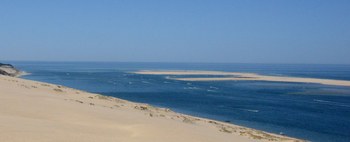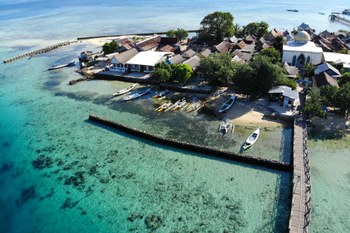Promote equitable education and training (EE)
Promoting equitable access to knowledge on coastal hazards and climate impacts, addressing disparities between the Global North and South.

Knowledge of coastal marine hazards and impacts of climate change on the coasts has increased in the past twenty years. However, the process of developing this knowledge and its results has not been equally shared among different communities, especially between the Global North and South.
To reverse this trend, training activities should be developed to inform, broadly and in a timely fashion, the public, Early Career Ocean Professionals (ECOPs) and professional practitioners on coastal resilience. Aligned with this strategic objective, the DCC-CR launched the Coastal Resilience School which operates on the IOC-UNESCO Ocean Teacher Global Academy (OTGA) platform (2023-2024 period).
The contributions of CMCC and Deltares will significantly enhance these efforts. Deltares will lead the establishment of an Itinerant Summer School on Coastal Resilience, focusing on capacity building in vulnerable regions of the Global South and providing targeted training in numerical modelling, data science, and the application of tools for coastal management. CMCC will lead the formulation of workshops on climate adaptation and coastal modelling and monitoring (citizen science and low-cost observing systems), along with specialized training programs for ECOPs, ensuring that the next generation of ocean professionals is equipped to address emerging challenges. Together, these initiatives empower communities and professionals with the tools and knowledge to foster resilient coastal systems.
Our Projects

Coastal Resilience School
In line with this mission, the DCC-CR, in collaboration with OceanTeacher Global Academy, has established the Coastal Resilience School. This initiative underscores the commitment to equitable education and knowledge-sharing in coastal resilience.
The School has debuted three courses in 2025:
- Sustainable Coastal Growth and Resilience: A hybrid course targeting early-career professionals, scientists, and practitioners worldwide, addressing critical challenges in coastal resilience.
- Coastal Modeling for Protection and Conservation of Natural Resources in the Philippines: A specialized course focused on ocean modeling and AI, tailored for biogeochemical characterization and enhancing resilience in the Philippines, in collaboration with CoastPredict.
-
Coastal Resilience to Sea Level Rise: A hybrid training course by FERS at CMCC in collaboration with the Coastal Resilience School of the DCC-CR and OTGA. It provided participants with the knowledge and tools to understand sea level rise risks, assess coastal vulnerabilities, and design effective adaptation strategies.
Other Educational Initiatives
Climate and Oceanography Course for High School Students in Rimini
The DCC-CR, in collaboration with Comune di Rimini (Rimini Blue Lab) and CMCC, is curating the Corso Clima e Oceanografia, for the students of the 4H class at Liceo Scientifico Einstein in Rimini. Tailored for high school students, the course introduces key concepts in oceanography, exploring the Earth's climate system, climate change impacts, ocean circulation, seawater properties, and data analysis. Through hands-on experiments and field measurements, students gain practical experience and a deeper understanding of marine and climate sciences.
Cloud Native Ocean Data Analysis and Visualisation School
As part of its educational and capacity-building activities, the DCC-CR has supported the Cloud Native Ocean Data Analysis and Visualisation School, co-organized by CMCC (member of the DCC-CR Partner Alliance Network), the University of Bologna, EGI, and EDITO.
The school gathers 40 participants, both in person and online, and focuses on cloud-based ocean data analysis, interactive visualization, and scalable computing tools for marine research.
DCC-CR Contributes to Educational Podcast on the Deepwater Horizon Disaster
The DCC-CR actively engages in educational and outreach initiatives aimed at fostering greater awareness of coastal and marine resilience. Among these activities is the participation of Professor Nadia Pinardi in “Blu, Petrolio”, a podcast produced in 2024 by Zanichelli, a leading Italian publishing house specialized in educational content.
The six-episode series, hosted by journalist Enrico Bergianti, revisits the 2010 Deepwater Horizon disaster in the Gulf of Mexico—the most severe offshore oil spill in history.
Professor Nadia Pinardi contributed as an expert guest in Episode 6, which reflects on what has been learned from the disaster, the scientific advances in oceanography over the past decade, and the ongoing challenges related to oil spills and environmental risk management.
Our training opportunities
No events available today
At the University of Bologna
The University of Bologna provides a wide range of programmes, spanning from undergraduate to doctoral levels, that delve into the complexities, unique characteristics, and challenges of coastal areas. With a multidisciplinary approach, the University leads the way in fostering knowledge development in these subjects.

WACOMA - Water and Coastal Management
WACOMA deals with analysis and management of marine coastal areas. Through an interdisciplinary approach, students gain a deep understanding of coastal processes (coastal erosion, saline intrusion, chemical and biological pollution, biodiversity loss, etc.) and ability to manage risks associated with natural and human-induced events, consequences of global changes, and measures for mitigation and adaptation.

Science of Climate
The Master's Degree programme in Science of Climate provides solid and multidisciplinary competencies about our climate system. This interclass programme focuses on topics belonging to both physics and geophysics, such as atmospheric and oceanic mechanisms, the interaction of the main components of the Earth system, the role of the Earth’s surface and techniques for climate data management.

Future Earth, Climate Change and Societal Challenges
The PhD program is organized around 5 Curricula that are related to 5 Research Themes called (a) the earth system, (b) impacts, adaptation and vulnerability, (c) Technological innovations for a decarbonized society, (d) Socio-economic and legal studies for mitigation of climate change, and (e) One Health. The Training is subdivided into:
a) Thematic courses focused of the 5 Research Themes;
b) Specialized courses.